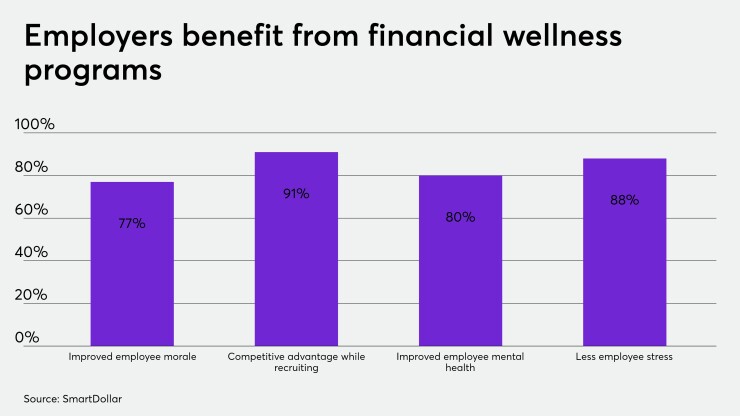More than 40% of Americans say the pandemic has caused them financial stress, forcing many to turn to their 401(k)s to help them weather the storm.
This drastic action has shown human resources and benefits leaders that employees need more than just retirement benefits. While 401(k)s are obviously an important part of a benefits strategy, they aren't helping with the short-term financial stress that employees have right now. Without other affordable alternatives, employees may cannibalize their own future financial security to make ends meet today.
More than one-third of American workers have withdrawn money from their 401(k) over the last year and 20% have withdrawn $10,000 or more. Nearly two-thirds of those who have borrowed from their retirement savings say they’ve done so because it was the easiest and lowest cost loan option available to them.
Read More:
That’s unacceptable. In addition to paying income tax on whatever amount they borrow, workers are paying an extra 10% penalty if they are under 59-and-a-half-years-old and they leave their job with the loan outstanding.
And what are the chances you'll terminate your employment during the loan repayment period? This is the worst-case scenario for 401(k) borrowers, because most plans require you to repay the remaining loan balance in full within 60 to 90 days after you terminate employment. In this case, about 86% of borrowers default.
Where does this conundrum leave human resources and benefits leaders? Here are three best practices to help employees who are contemplating borrowing money from their retirement funds.
Read More:
Create opportunities for your workers to gain financial literacy. In order to make the right financial decisions, employees need to understand how to manage money and the financial tools available to them. Unfortunately, less than 60% of Americans are financially literate, and this issue is quickly becoming a DEI problem, too. Less than 40% percent of women are financially literate, and 90% percent of women have equal share in or lead financial and investment decision-making for their households. On its personal finance index exam, the TIAA Institute found that 38% percent of Black Americans answered the index questions correctly, compared to 55% percent of those who are white.
As these two business priorities converge, build a robust education program that includes resources on how to budget, open and monitor bank accounts, set aside emergency cash, set financial goals, understand and improve credit scores, recover from a financial setback and provide opportunities for mentorship.
Add programs that help employees cope with their day-to-day lives. All Americans have lived through trauma since the beginning of the pandemic. Many of them are dealing with problems that run far deeper than work: four out of 10 Americans are providing financial assistance to a parent, sibling or child, and one-third said it’s had a significant impact on their personal finances.
Progressive companies are stepping up to the plate and offering their own corporate paid leave plans to provide greater flexibility for employees. By enabling employees to take paid leave, they are also giving them time to come up with better alternatives to pulling money from their 401(k).
Offer financial benefits that provide an affordable alternative. If an employee’s options are pulling money from a 401(k), securing a high-interest payday loan or drawing against a credit card, employees are naturally going to choose their 401(k), as it’s likely the lowest risk and most affordable option. But that can also be a short-sighted decision that doesn’t consider the long-term financial implications.
Salary-linked voluntary benefits provide an alternative to high-interest loans or the pain of dipping into retirement funds. By offering low-interest loans or emergency savings accounts, in which repayment and contributions can be easily pulled directly from the employee’s paycheck, companies have an opportunity to make a real impact on the financial wellness of their workers.
Read More:
American workers are struggling and, historically, it has not been second nature for companies to step in and help. But big business is becoming more empathetic and there’s a real opportunity for them to do good for employees. By proactively encouraging financial literacy and adding broader programs and financial benefits that can give employees some confidence, employers can put employees in a better position to not mortgage their future for the present.






